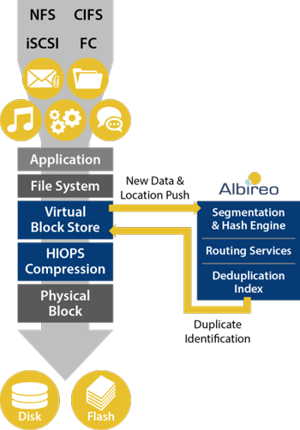Permabit VDO Delivering Performance on Samsung NVMe PCIe SSDs
Software for Linux exceeded 8GB/s throughput for inline compression.
This is a Press Release edited by StorageNewsletter.com on December 29, 2016 at 1:54 pmPermabit Technology Corporation announced that its Virtual Data Optimizer (VDO) software for Linux has exceeded the 8GB/s performance throughput barrier for inline compression.

This was accomplished running on a single Samsung Electronics Co., Ltd. ‘ NVMe all-flash reference design node.
The latest version of VDO’s HIO/s compression has been optimized to take advantage of today’s multi-core, multi-processor, scale-out architectures to deliver performance in enterprise storage.
To demonstrate this level of performance, the company combined VDO with Red Hat Ceph Storage software and 24 480GB Samsung PM953 U.2 NVMe PCIe SSDs running on the Samsung NVMe reference design platform. Samsung Electronics is offering U.2 Gen 3 X4 NVMe PCIe SSDs. The PM953 that was used in the testing also features 9W TDP (Total Dissipated Power) and a z-height of 7mm.
The resulting reference architecture delivered single-node performance of over 8GB/s read and 3.6GB/s write performance under workloads generated by Ceph RADOS bench. These results are more than twice as fast as published compression performance numbers by proprietary single node storage arrays and were achieved without the use of hardware acceleration boards.
Today’s data center managers are increasingly turning to architectures built around software-defined storage (SDS) to provide highly scalable solutions that control costs. SDS solutions (such as Red Hat Ceph Storage and Red Hat Gluster Storage) must be able to handle enterprise workloads such as databases, virtual servers and virtual desktops as well as, or better than, the proprietary systems that they are meant to replace. While data compression reduces storage costs, one challenge up until now, has been finding a compression approach that could run at high-end enterprise speeds, on standard hardware in an open Linux environment. HIO/s compression technology, incorporated into VDO, addresses these requirements because it serves as a core service of the OS. Any SDS solution that runs on that OS can then scale out to support petabyte-sized deployments.
“Previous systems relied on proprietary hardware acceleration based on ASICs or FPGAs to deliver a similar level of performance. Permabit Labs has demonstrated for the first time that HIO/s compression can be achieved with industry-standard processors and platforms,” said Louis Imershein, VP, product, Permabit. “We’re looking forward to also leveraginge the full multi-node, scale-out capabilities of the Red Hat Ceph storage platform as we test further in 2017.”













 Subscribe to our free daily newsletter
Subscribe to our free daily newsletter

